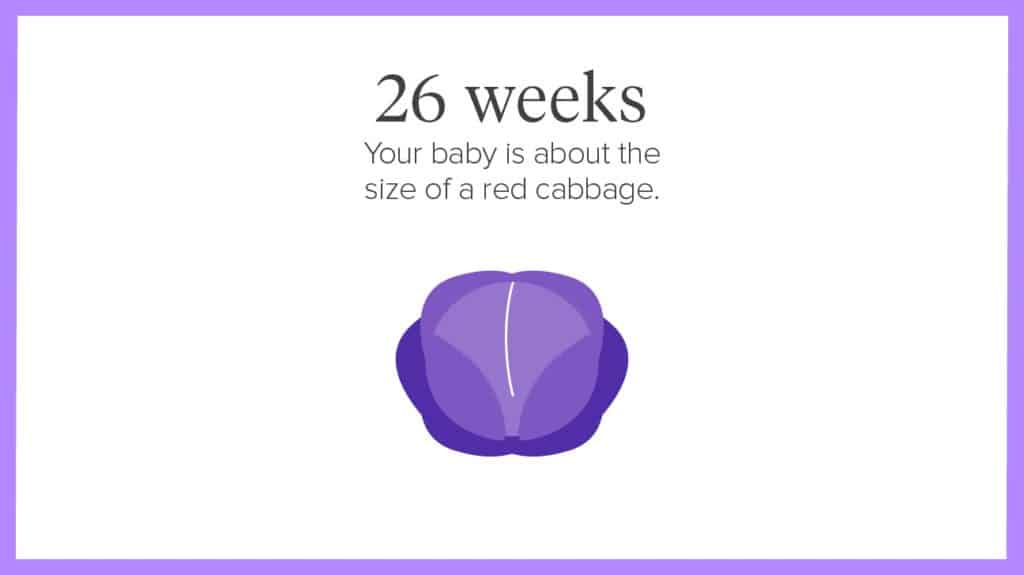
Table of Contents
The closer you come to the delivery date, the more preparations for the baby will be more, from cradle to bassinets, you need to prep-up everything! And, your baby’s eyes have started to develop now.
So what else is happening to the baby in the 26 weeks pregnant?
Your baby is beginning to get on a normal routine, and it’s one that could keep you awake at night. See what’s going on with your baby’s growth this week.
1. Sleep routine:
Now that they’re up from below, your baby is beginning to establish normal sleep cycles and wake up cycles. Don’t be shocked if they’re around while you’re still asleep when you’re on the run.
2. Immune system:
Your baby is beginning to develop up immunities to defend from infections after birth, due to the placenta.
3. Eyes
The eyes of the baby are developing this week. They’re going to start to open soon! Their color will not be certain until several months after giving birth.
4. Lashes
In 26 weeks pregnant, the baby’s eyelashes are beginning to create, prepare for the big unveiling. Right now all of the baby’s hair is white, but it will gradually grow pigment.
What happens to a mother’s body in the 26 weeks pregnant?
1. Hemorrhoids:
Several pregnant women experience hemorrhoids, which are differences in varicose veins (literally swollen blood vessels) in one of the most vulnerable parts of the body. They range from unpleasant to extremely intense, and they can cause bleeding while you’re taking a dump. Try not to get constipated by eating a high-fiber diet, drink lots of water, and exercise daily. Do your Kegels, too. If you’re still suffering from hemorrhoids, consider buying a seating bath that goes to your toilet and allows you to wash that sensitive area in warm water. Use certain baby wipes that you store on or get some shea butter to help calm the region.
2. Higher blood pressure:
If your blood pressure is mildly elevated (140/90 or higher) at a doctor’s appointment, it’s probably not huge and it’s just a one-time occurrence. If elevated blood pressure is first observed after 20 weeks, it is called gestational hypertension. This is a pregnancy-induced disorder that is supposed to go off post-delivery. You will be monitored closely as one in four women with gestational hypertension experiences preeclampsia, a very severe pregnancy disorder.
3. Back pain:
50 to 70% of pregnant women experience back pain as their pose and center of gravity alter, and the additional weight is a lot to hold their backs. You may find that your back hurts more when you’re stressed out. Rest, physical therapy activities and a support belt will help. Often, wear comfortable shoes and sleep with a maternity pillow on your foot. Some expectant mothers claim that a visit to a chiropractor or a massage therapist benefits them. If you choose this path, find someone with expertise in prenatal care.
4. Headaches:
Headaches are normal in pregnancy—hormones, changes in balance and sight, exhaustion, hypoglycemia, dehydration, and stress can all lead. Doctors usually have OK Tylenol during pregnancy (acetaminophen) for most people, but ibuprofen (Advil and Motrin) and aspirin are a big no-no. Speak to your healthcare professional if you have migraine headaches.
26 weeks pregnant belly:
26 weeks of maternal weight gain is usually between 16 and 22 pounds, relying on your initial weight. You may feel approximately two and a half inches beyond your belly button at the top of your womb. You will have your fundal height checked at the next gynecologist appointment (probably at 28 weeks to ensure that the amniotic fluid levels and baby’s development are on target.
26 weeks pregnant symptoms not to ignore
While many symptoms during pregnancy are normal, there are certain signs at 26 weeks that may require prompt attention. If you experience any of the following, consult with your healthcare provider:
- Vaginal Bleeding: Any amount of vaginal bleeding should be reported to your healthcare provider, as it could indicate potential complications.
- Severe Abdominal Pain: Persistent or severe abdominal pain, especially if accompanied by other symptoms, could be a sign of preterm labor or other issues.
- Severe Headaches or Vision Changes: These symptoms may be indicative of conditions such as preeclampsia, which requires immediate medical attention.
- Significant Swelling: While some swelling is normal during pregnancy, sudden and severe swelling in the hands, face, or legs could be a sign of preeclampsia.
- Decreased Fetal Movement: A noticeable decrease in your baby’s movements could be a cause for concern. Changes in fetal movement patterns should be reported to your healthcare provider.
Always trust your instincts, and if you’re ever unsure about a symptom or feel that something is not right, contact your healthcare provider promptly. Regular prenatal check-ups are crucial for monitoring both your health and the well-being of your baby.
Finishing Thoughts-
Kudos! You have beautifully passed halfway through your pregnancy and we know the rest of your journey would be this amazing only. Try to keep an eye on the check on the supplies and medications you are taking so that you don’t run short of them. Also, be in touch with your gynecologist so that they don’t miss out on any important updates regarding your pregnancy.





